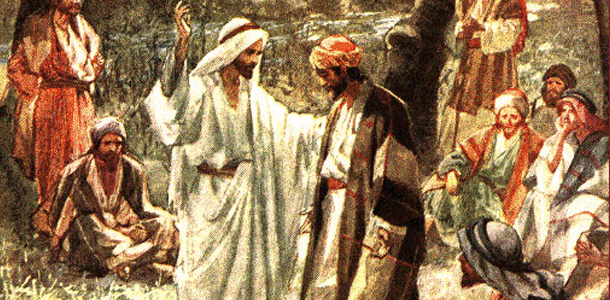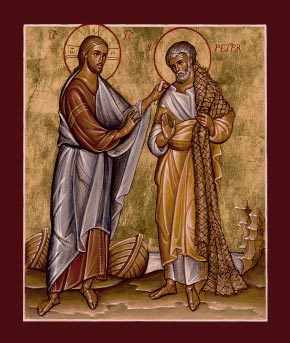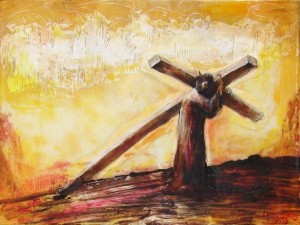Affirmation, identity and purpose of Jesus’ mission
September 11, 2012 By Fr. Thomas Rosica

Twenty-fourth Sunday in Ordinary Time, Year B
The readings for this Sunday are: Isaiah 50:5-9; James 2:14-18; Mark 8:27-35
Today’s Gospel story (Mark 8:27-35) is about affirmation, identity and purpose of Jesus’ mission. Mark makes this episode the centrepiece of his Gospel. It comes immediately after Jesus’ healing of the blind man of Bethsaida.
This restoration of sight must surely set the scene for Peter’s confession of faith and the glorious moment of the Transfiguration. Jesus’ nature is now gradually revealed to the disciples. Their blindness is cured but they still do not understand the full meaning of what they see. From this point on, everything in Mark’s Gospel moves toward the crucifixion.
If there was ever a “turning point” in Mark’s account of Jesus’ public ministry, it is today’s story. During my graduate studies in Israel in the 1990s, I had the privilege of working closely with the Israeli archeological team on the excavations in Caesarea Philippi, now known as “Banias” referring back to “Paneas” or the Greek god Pan. Sexual excess and violence ran rampant in this centre for the worship of the Greek god Pan. At the time of Jesus, a fertility cult was thriving in this pagan temple on the border of northern Israel and Syria at the foot of majestic Mount Hermon. Jesus and his disciples entered the area of Caesarea Philippi as part of a long journey from their familiar surroundings.

Caesarea Philippi had been built by Philip, another generation of the Herodian family, and it was a garrison town for the Roman army. Here in this centre of pagan worship to the Greek god Pan, Jesus asks about their understanding of his identity. Jesus asks what people are saying about him. How do they see his work? Who is he in their minds? Probably taken aback by the question, the disciples dredge their memories for overheard remarks, past conversations, opinions and gossip circulating in the fishing towns of the lake area. Jesus himself is aware of some of what is being said and knows only too well the hurtful attitudes of his own townsfolk of Nazareth.
In response to Jesus’ question, the disciples list a whole series of labels that people have applied to Jesus. These names reveal the different expectations held about him. Some thought of him as an Elijah, working toward a real confrontation with the powers that be. Some saw him more like Jeremiah, no less vehement but concentrating more on the inner journey, the private side of life.
Jesus pursues the question further – “Who do you say that I am?” and Peter responds, “You are the Christ” of the one true God. Jesus acknowledges this identification but forbids them from making his messianic role known to avoid confusing it with ambiguous contemporary ideas associated with that title. Then Jesus goes on to say, somewhat enigmatically, that the Son of Man must suffer, be rejected, die, and rise again.
The concept of Messiah in Judaism
There was no single concept of “Messiah” in Judaism. The idea of Messiah “anointed one” as an ideal king descended from David is the earliest known to us, but in the Maccabaean period (163-63 B.C.) the Greek Testaments of the Twelve Patriarchs give evidence of belief in a Messiah from the tribe of Levi, to which the Maccabaean family belonged. The Dead Sea Scrolls contain various ideas: a priestly Messiah and the (lay) Messiah of Israel; a prophet like Moses (Deuteronomy 18:18-19) who is also the star coming out of Jacob (Numbers 23:15-17); but also the Davidic Messiah. Melchizedek is a deliverer also, but is not called Messiah.
To proclaim Jesus as the Messiah was a loaded and dangerous statement. It was all that Jesus’ enemies needed to use against him, and already there were many who were ready to enlist under the banner of a royal pretender. But, far more than this, such a role was not Jesus’ destiny. He would not and could not be that kind of militaristic or political Messiah.
Identifying Jesus’ role today
The struggle to identify Jesus and his role as Messiah continues today. Some say individual Christians and the whole Church should be Elijah figures, publicly confronting systems, institutions and national policies. That was the way Elijah saw his task. Read the First Book of Kings (Chapters 17 to 21) to see what Elijah endured. Those filled with violence don’t usually bring about peace and justice in situations that are terribly unjust and wrong. Some say, like Jeremiah, that the reign of Christ, through his Church, is the personal and private side of life. And there are indeed many who would like to reduce religion and faith to a private affair in our world today.
Jesus probes beyond both approaches and asks, “You, who do you say I am.” In Peter’s answer, “You are Christ,” blurted out with his typical impetuosity, we are given a concept that involves both of the above ideas and goes beyond them. The Messiah came into society, and into individual lives, in a total way, reconciling the distinction between public and private. The quality of our response to this question is the best gauge of the quality of our discipleship. Everyone at some stage must come to Caesarea Philippi and answer the question, “You, who do you say I am?”
Some facts about Jesus
As we continue to give answer to the question: “Who is Jesus for us?” let us recall certain facts about Jesus’ background, identity and mission that have prepared the mission of the Church in the world today:
- Jesus was born of the political tribe of Judah–not the priestly tribe of Levi nor the priestly family of Zaddok. Jesus was not a politician.
- Jesus did, however, have a keen sense of politics. World mission cannot be undertaken independently without serious interaction with politics.
- Jesus established himself at Capernaum rather than at Qumran in the desert or in some remote village or place away from the thick of things. In Capernaum, on the northwest shore of the Sea of Galilee, there was a mainroad, tax collectors, and dealings with the Roman centurion. Jesus was very much at home in Capernaum, not in Jerusalem.
- Jesus bonded himself with the unclean, the sick and dying, with sinners, and those living on the fringes of society. Through his life, Jesus puts biblical justice into practice in proclaiming the Beatitudes. Authentic justice is a bonding of one’s self with the sick, the disabled, the poor and the hungry. But he did not neglect others as well. He dined with the rich and the mighty as well as with the poor and downtrodden. He befriended sinners and the wretched of his times – never condoning their behavior, but inviting them to an alternative lifestyle. He teaches us that by “being with people” he also teaches and heals. His human solidarity with the unclean, the unjust and sinners also saves.
- Jesus did not preach the political kingdom of David but the Kingdom of God. He had a great ability to appeal to everything and incorporate everything into his vision of kingdom. During his lifetime, he only tried to fulfill the hopes of Israel. The Good News he preached was ultimately about love. Contrary to some popular opinions still around today, Jesus was not a social revolutionary. He did not denounce injustice, but confronted it with love. It is striking how many of his parables assume situations of injustice, not to condemn the injustice but to show the zeal, ingenuity and perseverance of the unjust as a model for those who would live by love. Still, those who lived by injustice made no mistake when they recognized in Jesus and in those who followed him a fundamental challenge to their way of life.

Jesus’ words at the end of today’s Gospel “Whoever wants to become my follower, let him deny himself and take up his cross and follow me. For whoever wants to save their life will lose it, but whoever loses their life for my sake, and for the sake of the Gospel, will save it.” (v 34-35) challenge all believers to authentic discipleship and total commitment to himself through self-renunciation and acceptance of the cross of suffering, even to the sacrifice of life itself. The Way of the Cross was not for Jesus alone but also for everyone who professed to follow him. There might be victory and glory ahead, but it was only for those who could take up the Cross. If Peter or anyone else should reject this demand it meant to be on the side of Satan. Life seen as mere self-centred earthly existence and lived in denial of Christ ends in destruction, but when lived in loyalty to Christ, despite earthly death, it arrives at fullness of life.
Fr. Thomas Rosica, CSB
CEO, Salt and Light Catholic Media Foundation

No comments:
Post a Comment